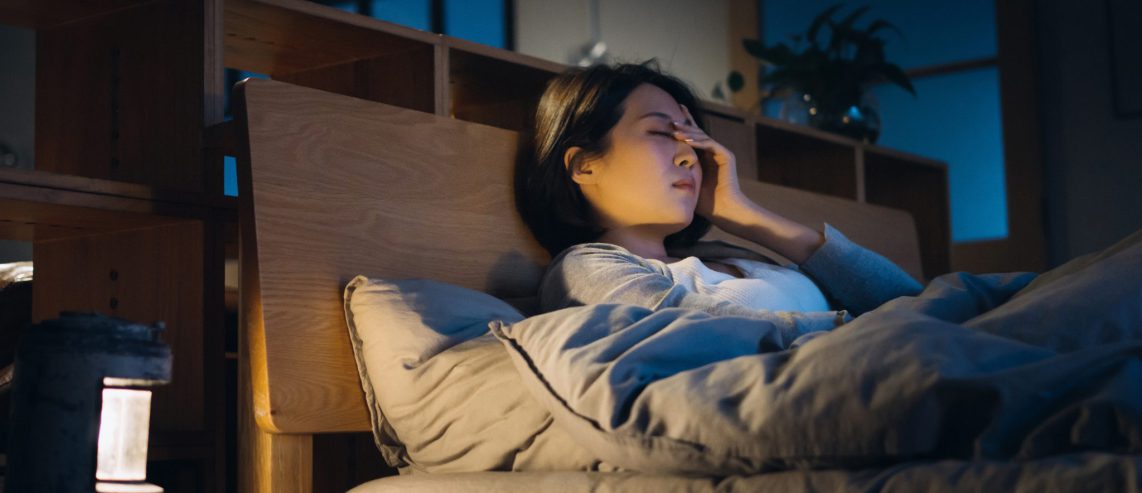High blood pressure, also called hypertension, is a common health issue. According to the Centers for Disease Control and Prevention, 47% of U.S. adults have hypertension or take high blood pressure medicine.
It’s also common for adults to get less than seven hours of sleep each night. The American Academy of Sleep Medicine suggests adults get at least seven hours of sleep each night for overall health. But more than 1 in 3 U.S. adults don’t get enough sleep, according to the CDC.
Your sleep quality and high blood pressure may go hand in hand. Sleep problems can raise your risk of high blood pressure. That’s according to a research review by the American Heart Association and a meta-analysis of studies published in Sleep & Breathing.
Whether you have high blood pressure or worry about your heart health, you should know about sleep and hypertension.
Sleep Problems and High Blood Pressure
It’s normal to get poor sleep now and then. Not getting enough sleep regularly is sleep deprivation. Over time it can lead to serious physical and mental health problems.
This includes heart health problems like high blood pressure, heart disease, and stroke. Doctors define hypertension as a systolic blood pressure reading greater than 130 mmHg or a diastolic blood pressure greater than 80 mmHg.
How does sleep affect blood pressure?
Getting a good night’s sleep helps to control blood pressure. During normal sleep, your blood pressure goes down.
But sleep problems can affect your body’s ability to control blood pressure. If your sleep is too short or choppy, your blood pressure stays high for longer.
So, how much does lack of sleep raise blood pressure? How much your blood pressure will rise because of poor sleep differs for everyone. You may have other health issues or poor lifestyle habits that affect your blood pressure.
Here’s how sleep problems can affect your blood pressure.
Not getting enough sleep.
Getting less than 7 to 8 hours of sleep regularly can raise your risk of high blood pressure. The higher risk of high blood pressure is more pronounced in people who sleep less than 6 hours each night.
Not getting enough sleep can also raise high blood pressure in teens. That’s according to a systematic review of studies in the Brazilian journal Pediatria.
Scientists don’t yet know why shorter sleep duration raises blood pressure. They suspect it may:
- Disrupt your body’s circadian rhythm, the body’s sleep-wake cycle.
- Raise nervous system activity.
- Raise how much sodium your kidneys hold on to.
- Trigger physical and mental stress.
You may struggle to get through your day if you don’t sleep enough. Studies link lack of sleep to mental health issues, such as anxiety and depression. When poor sleep affects mental health, making lifestyle choices that reduce your risk of hypertension can be hard.
Having obstructive sleep apnea (OSA)
Obstructive sleep apnea is a serious and common sleep-related breathing disorder. Having OSA, especially moderate to severe, raises your risk of high blood pressure. OSA also raises your risk of heart disease and early death.
With OSA, your upper airway collapses or partially collapses during sleep. You get less oxygen than your body needs to function well. Common signs include poor sleep, frequent and loud snoring, daytime fatigue, and sleepiness.
According to the National Library of Medicine, 21% of U.S. adults and 59% of people with heart disease have OSA. Some 30% to 50% of people with high blood pressure have OSA, according to a study in the journal Hypertension.
According to the AHA, short sleep combined with OSA is even more harmful to your blood pressure. People with OSA who sleep between 5 and 6 hours each night can raise their risk of high blood pressure by 45%. According to the AHA, those who sleep less than 5 hours can raise their risk by 80%.
Doing shift work
Shift work means you don’t work a traditional 9 a.m. to 5 p.m. job. Some 25% of the U.S. workforce performs night shift work. Among these workers, 62% sleep less than 7 hours during 24 hours, according to the AHA.
Never Miss a Beat!
Subscribe to Our HealthBeat Newsletter!
Thank you for subscribing!
You can now select the specific newsletters you'd like to receive.
You are already subscribed.
Subscribe to more newsletters in our email preference center.
Sorry, an error occurred. Please try again later.
Get Healthy Tips Sent to Your Phone!
Better Sleep, Better Blood Pressure
These sleep problems may lead to a rise in blood pressure. That means they can raise your risk of high blood pressure. But the AHA only considers OSA as a sleep-related secondary cause of high blood pressure.
Despite growing evidence, sleep health is not yet included in guidelines for managing high blood pressure. But your doctor may suggest getting enough quality sleep as part of lifestyle changes to control your blood pressure.
Tips for better sleep
Many people struggle with getting a good night’s sleep. If you do, these sleep hygiene tips may help you sleep better.
- Avoid alcohol, caffeine, and large meals before bed.
- Create a dark, relaxing bedroom atmosphere.
- Get regular daytime exercise.
- Go to bed and wake up at the same time every day, including weekends.
- Stay off electronics before bedtime. The blue light from devices can disrupt your body’s production of melatonin. This hormone helps control your body’s sleep-wake cycle.
Does High Blood Pressure Affect Sleep?
Certain medications to control blood pressure may interrupt your sleep. These include ACE inhibitors, alpha-blockers, and beta-blockers. These may interfere with melatonin production or cause side effects, such as nighttime leg cramps, that can disrupt sleep.
When To See Your Doctor?
You should get your blood pressure reading as part of a regular check-up. Talk to your doctor if you have trouble sleeping after making lifestyle changes. They can refer you to a sleep specialist to figure out what’s causing your poor sleep.
It’s also important to see your doctor if you have any signs of OSA, such as excessive snoring. OSA is often undiagnosed and undertreated.
Getting your OSA under control is vital in managing your blood pressure. Treatment options, including wearing a CPAP machine at night, can keep your airway from collapsing and help you sleep better.
Editor's Note: This article was originally published on , and was last reviewed on .
Sources
Effect of Sleep Disturbances on Blood Pressure. Hypertension. April 2021. American Heart Association. Link.
Sleep Apnea Syndrome. StatPearls. National Library of Medicine. Link.
Obstructive Sleep Apnea. American Sleep Apnea Association. SleepApnea.org. Link.
Harmonization of the American College of Cardiology/American Heart Association and European Society of Cardiology/European Society of Hypertension Blood Pressure/Hypertension Guidelines: Comparisons, Reflections, and Recommendations. Circulation. AHA Journal. American Heart Association. 2022. Link.
What Are Sleep Deprivation and Deficiency? National Heart, Lung, and Blood Institute. Link.
Sleep and Sleep Disorders. Adults. Centers for Disease Control and Prevention. Link.
Facts About Hypertension. Centers for Disease Control and Prevention. Link.
Han, B., Chen, W. Z., Li, Y. C., Chen, J., & Zeng, Z. Q. (2020). Sleep and Hypertension. Sleep & Breathing. Link.
Santos, E. S. G. D., & Souza, O. F. (2021). Evidence of the Association Between Sleep Duration and Blood Pressure in Adolescents: A Systematic Review. Revista paulista de Pediatria. Link.
About UPMC
Headquartered in Pittsburgh, UPMC is a world-renowned health care provider and insurer. We operate 40 hospitals and 800 doctors’ offices and outpatient centers, with locations throughout Pennsylvania, Maryland, New York, West Virginia, and internationally. We employ 4,900 physicians, and we are leaders in clinical care, groundbreaking research, and treatment breakthroughs. U.S. News & World Report consistently ranks UPMC Presbyterian Shadyside as one of the nation’s best hospitals in many specialties and ranks UPMC Children’s Hospital of Pittsburgh on its Honor Roll of America’s Best Children’s Hospitals. We are dedicated to providing Life Changing Medicine to our communities.

